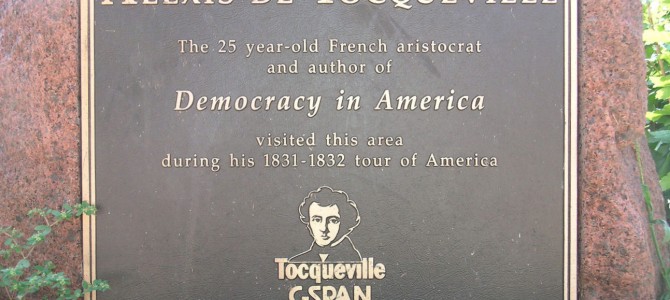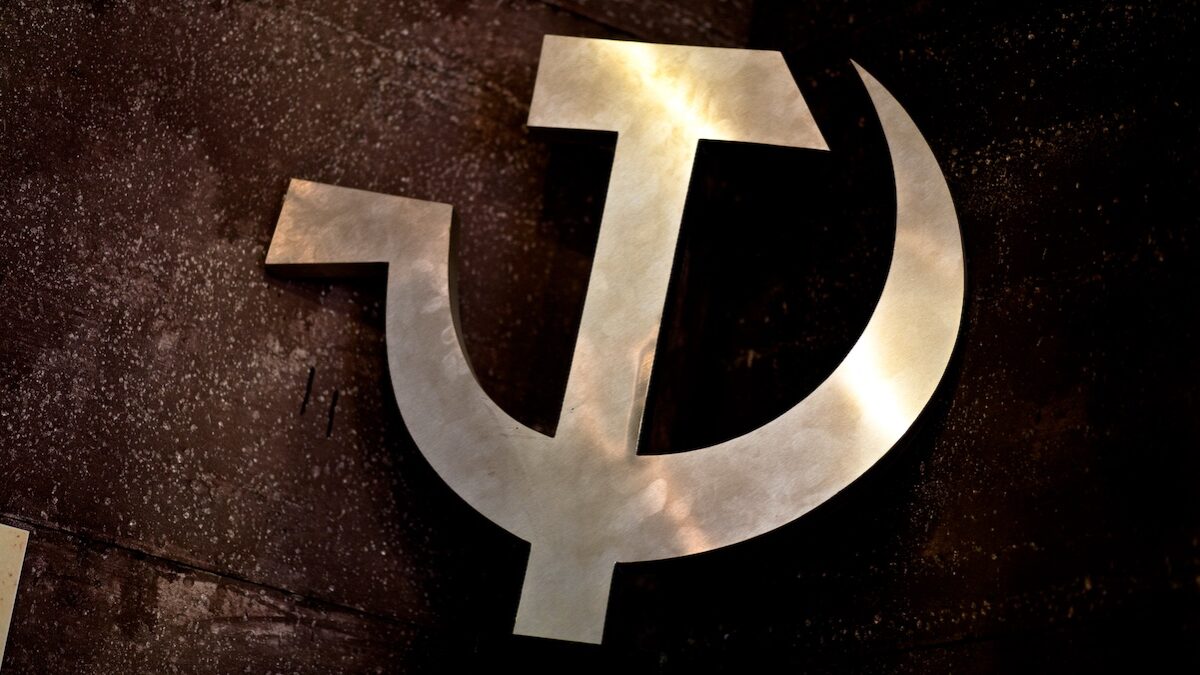
This is the first installment of a new series: a Frenchman reads Democracy in America and investigates how it applies to the contemporary United States.
In Democracy in America, Alexis de Tocqueville doesn’t waste any time letting you know what impresses him most about America. To Tocqueville, equality and, to a slightly lesser — but very important — extent, religiosity, are the two foundations of the American experiment. His understanding of them certainly challenges both liberal and conservative sensibilities. But what does it say about America today that these two aspects of the American experience seem to be at all-time lows? And does Tocqueville point to a way forward?
The importance of economic and social equality
Tocqueville praises equality in his very first sentence: “Among the many things which drew my attention during my stay in the United States, none struck me more than the equality of conditions.” Two paragraphs later: “As I went on studying American society, I saw more and more in the equality of conditions the main fact which seemed to cause every other particular fact, and I kept seeing it before me as a central point to which all my observations led.”
Conservatives might not enjoy Tocqueville’s praise of economic and social equality as key to the success of the American experiment, but with some thought, you realize that Tocqueville is giving us a welcome way out of our incredibly dreary debates on the topic. A lot of conservatives claim that while the Left believes equality means equality of outcome, the Right is for equality of opportunity — but that’s a load of hooey. Everyone agrees with equality of opportunity, and all non-communists agree equality of outcomes is not desirable. The question is whether too much inequality of outcome leads to a greater inequality of opportunity. It’s a stubborn fact that, as a matter of dollars and cents, American society has gotten more unequal over the past 30 years. Does it mean that it has also become unequal in other ways? And if so, should we do anything about it? And what? Does Tocqueville show us a way?
The answer is yes, when we realize a few things. First, that while what Tocqueville is really talking here is equality of conditions and not merely formal, legal equality. Tocqueville, after all, was no socialist. He was a classical liberal who admired Adam Smith and viewed redistributive taxation with deep skepticism. And Tocqueville notes that the US, even in the 18th century, had some pretty significant extremes of wealth (even in non-slave states). So while he’s not pointing to socialism, he is pointing to something else, and that something might be this: any collective endeavor, including self-government but also functioning free-market capitalism, cannot be successful for long if some significant number of the people involved in the enterprise feel that they’re getting screwed. Even if you see no value in equality as such and you are a total capitalist red-in-tooth-and-claw you must realize that if too many people feel that capitalism destroys them, at some point they will use the levers of political power to destroy capitalism.
At another level, Tocqueville’s endorsement of the concept of equality of conditions, in context of his lack of distaste for free markets, points to an important insight : that what matters may not be so much inequality in terms of dollars and cents, but in terms of way of life. Think of the fact that, in opinion polls, the vast majority of Americans at all income levels describe themselves as “middle class.” Is the life of someone at the 20th percentile of income so different from that of someone at the 90th percentile? In some ways, sure. But both these people are likely to have a house, a car, drive to work, share a number of values, etc.
Of course, in different ways, these people are driving apart. In particular, as Charles Murray has noted, we are witnessing (to coin a phrase) an increase in marriage inequality as those at the top manage to build successful, solid families, whereas those at the bottom are seeing the institution wither away. When we are aware of the gains from strong families in terms of social, human and even financial capital, conservatives can see here that we truly have an inequality of conditions that should concern us.
The paradox of America’s religious liberalism
After equality, Tocqueville points to another vital foundation for the success of the American experiment: religiosity.
Tocqueville faithfully records how the first colonies were in many ways theocracies. In some locales, the law was reduced to the Ten Commandments, and the only punishment—including for things like adultery or apostasy—was death. Our moderately religious European aristocrat is duly horrified. But he notes the paradox: as illiberal as those societies were, they were liberal in many other ways. In these societies, all other laws were passed by common consent. Through public deliberation, public services were rendered, taxes decided and administered, and almost all public magistrates were elected—an extent of self-government that was, at the time, unique on the face of the Earth.
One of the aspects where religion and freedom are most stunningly and intimately connected, Tocqueville writes, is education. Not without amazement, he cites the preamble of the section of the 1650 Connecticut Code of laws concerning education: “Whereas Satan, the enemy of humankind, finds in ignorance his most powerful weapons, and whereas it is important that the enlightenment brought by our father be not buried in their graves; whereas the education of children is one of the first interests of the State, with the help of the Lord…” and notes that the law mandated public education for all children. Countless sociologists and historians have pointed to this as one of the key origins of America’s exceptional economic trajectory : the fact that, with religious motives, America educated its population much more and much sooner than the rest of the world, leading to a much more productive workforce.
Tocqueville understands full well the paradox of America’s religious liberalism. In a key passage, he writes “I have said enough to put in its true light the character of the Anglo-American civilization. It is the product (and we must always keep this foundation in mind) of two perfectly distinct elements, elements that have often been at war with each other, but that America has managed to, so to speak, integrate in one another in a marvelous way. I am speaking of the spirit of religion and the spirit of liberty.” [Emphasis his.]
He goes on: “Far from hurting each other, those two tendencies, seemingly so opposed, work together and seem to support each other. Religion sees in civic liberty a noble exercise of man’s faculties, and in the political realm a field given by the Creator to man’s intelligence. […] Liberty sees in religion the handmaiden of its struggles and triumphs, the cradle of its infancy, the divine source of its rights. She sees religion as the safeguard of morality, and morality as the guarantee of the laws and of its own posterity.”
And today, where do we stand? Obviously, religion in American life is on a downward slide. This fact is connected to the inequality mentioned above : since the “upper slice” is very often irreligious, and since this slice often sets the tone for the culture at large, the culture is influenced by the forces of secularization. As NPR’s Ira Glass pointed out once, when was the last time you saw a normal person in a Hollywood movie just pray?
Tocqueville understood very well that which is seemingly so hard for progressives to understand, which is that religion strengthens liberty insofar as it provides the moral foundations that prevent liberty from destroying itself. In contemporary sociological terms, we can put this differently : we can say that given the twin 21st century realities of disruptive capitalism and the administrative state, the only viable check on either of them that doesn’t turn us into a slave to the other is voluntary institutions, which ensure that we have a rich, vibrant civic life.
Ross Douthat has been the best chronicler of this phenomenon. In his priceless book Bad Religion, he notes that America has always been a land of religious heretics—and even downright crackpots—but that this heresy was by and large a fruitful influence on American religion—and civic life—whenever it was balanced by institutional, orthodox religion, precisely the kind which is at a low ebb today.
The dynamic risks becoming self-reinforcing insofar as the weakness of institutional religion leads to its oppression. As, again, Douthat has chronicled, there is a new view of religious freedom arising which says, in essence, that traditional religious rules around sex are beyond the norms of civilized society and that bodies which dare to function by them must be brought to heel. Were this conception to become truly regnant, it would lead millions of believers to have to choose between allegiance to the state and allegiance to God, and it would lead to the crushing of countless voluntary associations, leaving a vacuum that could only be filled by the administrative state.
Tocqueville tells us that, were this to happen, in some fundamental sense, the American experiment in self-government would have lost its character. To prevent this, conservatives need to come up with some way to preserve the historic role of religion and of equality in American life.
Follow Pascal-Emmanuel Gobry on Twitter.









